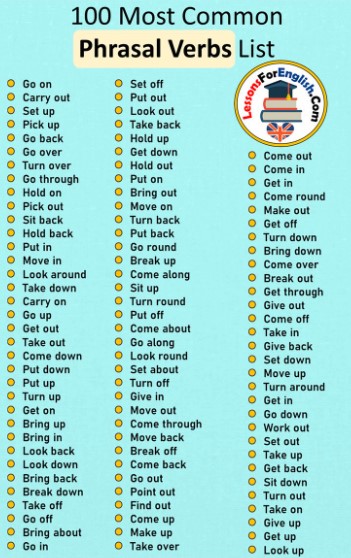Phrasal Verbs Unveiled: A Deep Dive into Everyday English Expressions
The English language, a vast ocean of words and expressions, throws its learners several curveballs. Among them, phrasal verbs stand as unique and sometimes enigmatic markers. Comprising verbs and particles (prepositions or adverbs), these expressions are quintessential in daily conversations. Let’s delve into their realm, demystifying their meanings, usages, and everyday importance.
Understanding Phrasal Verbs
A phrasal verb is a combination of a verb and one or more particles. The true magic lies in how a simple addition of a particle can transform the verb’s original meaning.
The Indispensability of Phrasal Verbs
- Everyday Communication: These verbs are staples in daily dialogues, bridging understanding gaps.
- Expressive Depth: They carry nuanced sentiments, allowing for articulate and precise communication.
- Cultural Footprints: Mastery over phrasal verbs helps integrate learners into English-speaking societies since they echo the language’s cultural rhythms.
A Glimpse into Common Phrasal Verbs & Their Uses
Break down
Meaning: To malfunction or to become emotional.
Example: The car broke down on the highway. She broke down after hearing the news.
Check out
Meaning: To exit after payment or to investigate.
Example: I checked out of the hotel this morning. Check out this new song!
Give up
Meaning: To quit or to stop attempting.
Example: She gave up smoking last year.
Turn up
Meaning: To arrive or to increase in intensity.
Example: She didn’t turn up for the meeting. Can you turn up the volume?
Run into
Meaning: To unexpectedly meet or encounter.
Example: I ran into my childhood friend at the park.
Pick up
Meaning: To collect or to improve.
Example: Could you pick up some bread? Business has been picking up.
Put off
Meaning: To delay or to cause aversion.
Example: We’ve put off our meeting until next week. His arrogance puts me off.
Come across
Meaning: To discover, usually by chance.
Example: I came across a fascinating book at the store.
Look after
Meaning: To care for.
Example: She looks after her younger brother.
Take off
Meaning: For a plane to ascend or to depart swiftly.
Example: The flight took off on time. He took off without saying goodbye.
Bring up
Meaning: To introduce a topic or to raise children.
Example: She didn’t want to bring up the awkward incident. He brought up two children on a modest income.
Hold on
Meaning: To wait or to grip tightly.
Example: Hold on, I’m fetching the information for you. Hold on to the railing as you go down the stairs.
Set out
Meaning: To begin a journey or to display.
Example: We set out at dawn for our trek. She set out all the dishes for the feast.
Log in/on
Meaning: To access a computer system or network.
Example: I can’t log in to my account; I’ve forgotten the password.
Sign up
Meaning: To register or enroll.
Example: I’ve signed up for the painting workshop next month.
Go over
Meaning: To review or inspect.
Example: Could you go over my report before I submit it?
Stand out
Meaning: To be noticeably different or prominent.
Example: His performance in the play really stood out.
Break up
Meaning: To end a relationship or to disperse a gathering.
Example: Sarah and John decided to break up after three years. The police arrived, and the protesters broke up.
Turn down
Meaning: To refuse an offer or to reduce volume/intensity.
Example: She turned down the job in New York. Please turn down the music; it’s too loud.
Look forward to
Meaning: To eagerly anticipate something.
Example: I look forward to our meeting next week.
Guidance for Mastery Over Phrasal Verbs
- Contextual Absorption: Grasp them within the backdrop of sentences. Context births clarity.
- Consistent Application: Embed them in conversations, writing exercises, or journals.
- Daily Exploration: Incorporate a ‘Phrasal Verb of the Day’ into your lexicon.
In Conclusion
Phrasal verbs, though intricate, paint English conversations with vibrant strokes. Embracing them not only refines linguistic prowess but also offers an authentic peek into everyday dialogues. As you journey through English, let phrasal verbs be your trusty compass, guiding you to expressive depths.

Hairstyles
I’m so in love with this. You did a great job!!